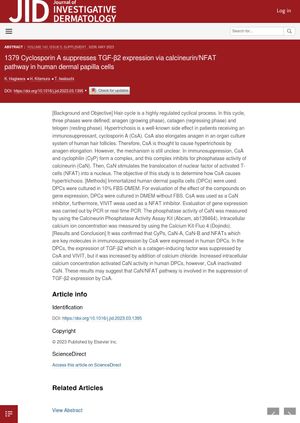Cyclosporin A Suppresses TGF-Beta2 Expression Via Calcineurin/NFAT Pathway in Human Dermal Papilla Cells
April 2023
in “
Journal of Investigative Dermatology
”

TLDR Cyclosporin A, a drug, reduces TGF-β2 expression in skin cells, potentially causing excessive hair growth through a process involving the calcineurin/NFAT pathway.
The study investigates how the immunosuppressant drug, cyclosporin A (CsA), causes hypertrichosis, a condition characterized by excessive hair growth. The researchers used immortalized human dermal papilla cells (DPCs) and found that key molecules involved in immunosuppression by CsA were expressed in these cells. They discovered that CsA suppresses the expression of TGF-β2, a factor that induces the catagen (regressing) phase of the hair cycle, potentially leading to anagen (growth phase) elongation and thus, hypertrichosis. This suppression was achieved through the calcineurin (CaN)/nuclear factor of activated T-cells (NFAT) pathway, which was inactivated by CsA. The study suggests that the CaN/NFAT pathway plays a role in the suppression of TGF-β2 expression by CsA, providing insight into the mechanism behind CsA-induced hypertrichosis.



